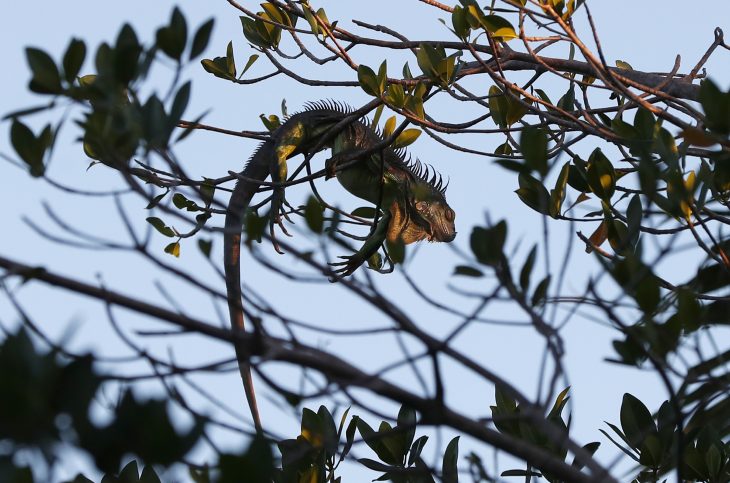Forecasters are predicting some unusual weather in Florida this week, where it’s already been cold and cloudy with a chance of falling iguanas in some parts of the state.

The National Weather Service made the unusual prediction Tuesday amid chilly temperatures in the Sunshine State. Florida is home to many iguanas, and the cold-blooded lizards can catch a fatal chill when the weather dips below freezing.
Basically, the iguanas get stunned by the cold and let go of the trees, then plummet to the ground. They don’t necessarily shatter or die, but they do become vulnerable to vehicle and foot traffic.
“This isn’t something we usually forecast, but don’t be surprised if you see iIguanas falling from the trees tonight as lows drop into the 30s and 40s,” National Weather Service Miami tweeted. “Brrrr!”
Those Fahrenheit temperatures translate to between -1 C and 4 C, putting them right around the freezing mark.
Iguanas aren’t typically dangerous to humans unless they’re falling like lizard icicles from overhead.
The lizards can be annoying under regular circumstances, as they often dig tunnels under golf courses, sea walls and sidewalks. A male iguana can grow to be about five feet long and weigh about 20 pounds.
The invasive reptiles are native to Central America but were brought to South Florida in the 1960s. Their numbers have swelled ever since.

Get breaking National news
Iguanas sleep in trees at night and are particularly vulnerable to overnight cold snaps, Ron Magill of Zoo Miami explained to the New York Times back in 2018. Magill spoke to the Times following a similar case of frozen falling iguanas.

“When the temperature goes down, they literally shut down, and they can no longer hold on to the trees,” Magill said at the time. “Which is why you get this phenomenon in South Florida that it’s raining iguanas.”
- U.S., Israel attack Iran as Trump urges Iranians to ‘take over your government’
- Canadians urged to leave parts of Middle East as conflict risk grows: Anand
- Read the full transcript of Donald Trump’s statement on Iran strikes
- Florida man pulled free after getting stuck in ‘quick sand’ like mud for days
He added that many iguanas recover from the fall once the sun warms them up again.
“Even if they look dead as a doornail — they’re grey and stiff — as soon as it starts to heat up and they get hit by the sun rays, it’s this rejuvenation,” he said.
Weather officials say a polar vortex is to blame for the current chill across Florida.
Speaking to CNN on Wednesday, Magill said some people will be happy for the cold front to hang over Florida for a few days, if only so it can get rid of more iguana-cicles.
“There are several iguana hunters that are looking forward to this upcoming cold front as it will certainly facilitate them removing these invasive reptiles from the South Florida environment,” he told CNN.
“They will not be able to run away!”
—With files from The Associated Press









Comments
Want to discuss? Please read our Commenting Policy first.